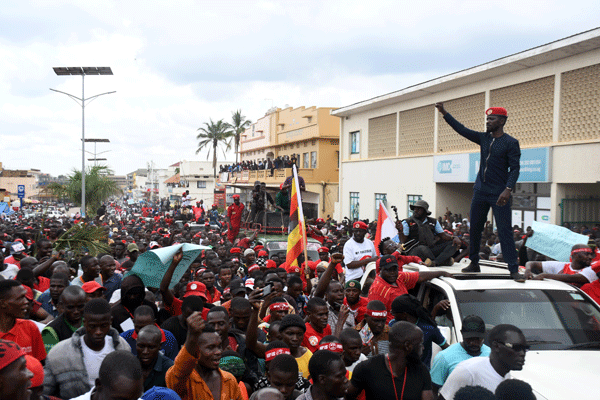Prime
The days of Bobi Wine; when the show stopped

Mr Charles Onyango-Obbo is a journalist, writer and curator of the “Wall of Great Africans”.
What you need to know:
- Even the most seasoned politician, which Bobi Wine isn’t, would have let the frantic crowds, in their tens of thousands or even in places considered to be Museveni, get to his head”
Something important happened in Uganda in August. There was a significant opening of the democratic space – or better, a rollback of the semi-authoritarian state.
It could even be traced back to July. Opposition politicians began enjoying one of the least repressive seasons they have seen in nearly 30 years. Opposition National Unity Platform (NUP) leader Robert Kyagulanyi, aka Bobi Wine, seized the opportunity like no other. He held national rallies, drawing the kind of massive and excited crowds last seen in the early days of his presidential campaign for the 2021 election.
The contrast from what Bobi Wine had endured the last two years was truly dramatic.
Shot at, beaten, arrested, tear-gassed, and held up at military police roadblocks where the tyres of his vehicles were punctured, Bobi Wine spent a few cold nights in his car on the roadside as he was caught up by Covid-era curfews.
He was forced to take to campaigning in a bulletproof vest, and helmet, and moving around in an armoured-plate car. Shortly after the vote on January 14, 2021, the police and military laid siege to Bobi Wine’s home, and he wasn’t able to get out for days.
Yet, there he was in the early part of September, waving freely from the rooftop of an SUV, enjoying a level of freedom he didn’t have as candidate Kyagulanyi.
Some suggested that the reason for this is that President Museveni and the ruling National Resistance Movement had put away the “kiboko”, and stopped whipping the opposition, as insurance against the coups that have swept the West Africa-Sahel region and Gabon in recent times.
Other folks saw the makings of how Museveni wanted the lasting memory of his rule to be. At 78 and clocking nearly four decades in power, all signs are that he wants a ninth term in 2026. What Museveni wants from an election he usually gets. When he “wins”, by 2031 he will have been in power for a mind-boggling 45 years. Grievances piled up over 45 years would be too much. Opening up the political space would allow some anger to be dispersed.
Additionally, one of the world’s youngest countries has fallen emotionally out of step with his presidency, and is tired of a rule that has been marred by violence, corruption and nepotism. The economic conditions on the ground have become harder, and the effectiveness of brutal force in containing disaffection in the long term is doubtful.
The oil pipeline to Tanzania has been slowed by years, and he needs to give it more momentum by cleaning up the authoritarian soundtrack that has fuelled the campaign against it. He needs the patronage with which to fashion his last years, and in current form, that can only come from oil.
But, as the good old saying goes, the best-laid plans of mice and men often go awry. And one could see it coming from 100 kilometres. Even the most seasoned politician, which Bobi Wine isn’t, would have let the frantic crowds, in their tens of thousands or even in places considered to be Museveni, get to his head. Perhaps running on adrenaline, in Luwero, Bobi Wine made the fateful remarks about outsiders exploiting the desperate conditions that they had imposed on Buganda, to snap up the people’s land cheaply and doom them to indignity. It was considered a sectarian step too far, and the clampdown was slapped on him. One of the freest four weeks in recent Ugandan politics thus came to an abrupt rude end.
However, that was more an excuse, rather than a reason, for shutting Bobi Wine’s rallies down. There are NRM politicians, who have said and continue to say 100 times more sectarian things than he did, and they are happily enabled by the NRM system to say them.
It seems that the calculation had been that because he had been shut down for two years, Bobi Wine had fizzled. There were a lot of commentaries by NRM people declaring that he was finished. They went ahead to drink their Kool-Aid. The reception Bobi Wine received brought them crashing down to reality.
I took a more permissive view. The clampdown on Bobi Wine likely represents the panic response of a currently dominant faction of the ruling NRM – or more accurately, the State House. It will not last very long. It has been that the last uncertain years of governments in Uganda usually attract concessions. Idi Amin, of all people, instituted a commission of inquiry into disappearances. Milton Obote II offered crumbs to the opposition, and anything their hearts desired to a restive army. It was too late. It ousted him in a coup a week later on July 27, 1985.
Mr Onyango-Obbo is a journalist, writer and curator of the “Wall of Great Africans”. Twitter@cobbo3





